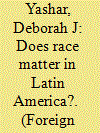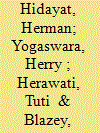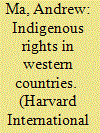|
|
|
Sort Order |
|
|
|
Items / Page
|
|
|
|
|
|
|
| Srl | Item |
| 1 |
ID:
137568


|
|
|
|
|
| Summary/Abstract |
In 1992, the Nobel Committee awarded its Peace Prize to Rigoberta Menchú Tum, the daughter of poor Guatemalan peasants, for her work promoting indigenous rights. Her prize, momentous in its own right, highlighted a sea change in Latin American politics. Throughout the 1980s and early 1990s, prominent indigenous movements had emerged in countries such as Bolivia, Ecuador, Guatemala, and Mexico. As a result, Latin American countries undertook unprecedented reforms to address ethnic diversity: politicians amended national constitutions to recognize indigenous people, passed laws supporting bicultural education and affirmative action, and added questions about race and ethnicity to official censuses.
|
|
|
|
|
|
|
|
|
|
|
|
|
|
|
|
| 2 |
ID:
144918


|
|
|
|
|
| Summary/Abstract |
Approaches and instruments focused on market mechanisms and private enterprises, including private protected areas, are promoted as ways to resolve global environmental and developmental problems. In Indonesia, Ecosystem Restoration Concessions (ERCs) have been developed as a new market-oriented governmental instrument to counter current deforestation processes and to restore forest ecosystems. Conservation and development organizations, along with state authorities, view ERCs as a highly promising instrument in Indonesia and in other countries as well. Experiences with ERCs are still limited, however, and their viability is uncertain. The implementation of ERCs in Indonesia has been controversial and the impact of ERCs on forests and forest-dependent communities has been fiercely disputed. This article explores these conflicts and disputes with a focus on the Harapan ERC and weighs the relevance of ERCs for German development cooperation. The improvement of the accountability of such projects and the implementation of mediation facilities are emphasized as prerequisites to establishing such market-oriented instruments according to international standards of nature conservation, the rights of indigenous and local populations, and sustainable development. The author concludes that decisions about strategies and instruments applied in forest-related development cooperation must involve a reconsideration of the mindsets that currently determine conservation approaches and development cooperation.
|
|
|
|
|
|
|
|
|
|
|
|
|
|
|
|
| 3 |
ID:
163234


|
|
|
|
|
| Summary/Abstract |
This paper reviews the emerging effects of the 2012 decision of the Constitutional Court of Indonesia relating to the customary management of Indonesia's traditional forests. It focuses on the challenge of moving from legal to political and societal recognition of Indigenous peoples’ rights. In its advocacy of customary land rights, Aliansi Masyarakat Adat Nusantara (AMAN) successfully applied to the Constitutional Court for judicial review of the Forest Law 41 1999. It argued the law breached the constitutional rights of its members in permitting the state to permit exploitation and development rights over traditional forest without their consent. The flow‐on effect of allocating such rights included widespread deforestation and land use change without agreement from customary communities that have used and occupied these forests for centuries, thus ignoring traditional customary law that regards these forests as the property of such communities. The paper reflects critically on international experience in the interface between legal recognition of Indigenous peoples’ rights, and their translation into sustainable and meaningful societal transformation.
|
|
|
|
|
|
|
|
|
|
|
|
|
|
|
|
| 4 |
ID:
138695


|
|
|
|
|
| Summary/Abstract |
The delicate environmental and political balance that composes the Arctic has made it one of the most hotly contested regions in the world. This fragility poses a direct threat to the traditional lifestyles and fundamental human rights of peoples indigenous to the region. While Antarctica is regulated by a strong treaty system, uninhabited and under international jurisdiction, the Arctic is inhabited by four million people, roughly 10 percent of whom identify as indigenous peoples, and its government is balanced among the eight countries with territory in the region—the USA, Canada, Denmark, Norway, Sweden, Finland, Iceland, and Russia. Decisions regarding the Arctic undergo a complicated process involving local governments, central governments, indigenous councils, and the Arctic Council—an international forum of Arctic states and interest groups. With its many levels and stakeholders, the system is far from efficient or effective.
|
|
|
|
|
|
|
|
|
|
|
|
|
|
|
|
| 5 |
ID:
129198


|
|
|
|
|
| Publication |
2014.
|
| Summary/Abstract |
The Canadian government has always tried to maintain Canada's reputation as a beacon of democracy and of a model of social contract theory. But James Anaya, the United Nations' special rapporteur on indigenous rights, may be challenging the impeccable Western democratic image that the international community has so liberally applied to the United States' northern neighbor.
|
|
|
|
|
|
|
|
|
|
|
|
|
|
|
|
| 6 |
ID:
126103


|
|
|
|
|
| Publication |
2013.
|
| Summary/Abstract |
While oil and gas industries are already well established in Siberia and Alaska, the melting of the Arctic ice cap is opening up new areas of the High North to hydrocarbon exploration. According to the US Geological Survey (USGS), the Arctic is expected to hold about 22 per cent of the world's undiscovered, technically recoverable conventional oil and natural gas resources (about 13 per cent of undiscovered oil reserves, 30 per cent of natural gas, and 20 per cent of natural gas liquids). 1 Greenland waters are believed to be particularly rich in oil, and may contain reserves of up to 50 billion barrels, equivalent of Libyan oil reserves. 2 Of the Arctic Council's five member states bordering the Arctic Ocean, Russia and Norway have already submitted continental shelf claims to the Commission on the Limits of the Continental Shelf. Another two member states, Canada and Denmark (on behalf of Greenland) are in the process of submitting their claims. Sovereign rights to offshore hydrocarbon reserves are key issues at stake in these claims. While some analysts see the scenario as a 'scramble' for Arctic hydrocarbons, others highlight the huge technological difficulties of oil and gas extraction in the Arctic, and suggest that territorial disputes are relatively insignificant. 3 Nevertheless, the Arctic region's substantial mineral and hydrocarbon wealth makes issues of sovereignty and governance all the more important to stakeholders, including indigenous peoples as well as states.
|
|
|
|
|
|
|
|
|
|
|
|
|
|
|
|
| 7 |
ID:
123494


|
|
|
|
|
| Publication |
2013.
|
| Summary/Abstract |
Focusing on the coexistence of competing and contested interests in intercultural natural resource management (NRM) systems in Australia and Malaysia, this paper explores the ways in which ontological pluralism and the interplay of socio-cultural, political-economic and biophysical influences shape NRM systems. We aim to foster a discursive space in which to reframe the challenges of capacity building in the rapidly changing spaces of intercultural NRM systems. The paper synthesizes the conceptual arguments of field research to conclude that capacity deficits of dominant institutions, processes and knowledge systems drive many systemic failures in land and sea management affecting Indigenous peoples. We advocate urgent action to build intercultural competence and new capacities and competencies in those institutions. The paper reframes intercultural NRM in terms of coexistence and invites wider debate about these 'new geographies of coexistence' in intercultural NRM systems.
|
|
|
|
|
|
|
|
|
|
|
|
|
|
|
|
| 8 |
ID:
082034


|
|
|
|
|
| Publication |
2008.
|
| Summary/Abstract |
The articles in this second of a series of three issues edited by
faculty in the Political Science Department at the University of
Hawai'i at Manoa examine the concept of "indigeneity" as it
pertains to aspects of law, policy, and governance. Focused on
the array of temporal and historical issues surrounding nationhood,
citizenship, law, and policy, the authors interrogate how
historical legal systems evolve through control of and resistance
by indigenous peoples and what the actions by state actors
say about how legal institutions treat the concept of "indigeneity."
The key issues surrounding "indigeneity" as a site of
critical inquiry within legal systems and governmental structures
raise key questions that these articles explore: What new
policies and systems are being created in the wake of global imperialism,
the war on terror, and the policing of national borders?
How are indigenous peoples rearticulating understandings of
governance and policy in their struggles for recognition, independence,
self-determination, and sovereignty? Finally, what distinguishes
indigenous governance, law, and policy, and what are
the possibilities and challenges facing such institutions both
locally and transnationally?
|
|
|
|
|
|
|
|
|
|
|
|
|
|
|
|
| 9 |
ID:
157400


|
|
|
|
|
| Summary/Abstract |
Bikin National Park is one of very few areas in the Russian Far East that remain untouched by those I consider the “wild barbarians of civilization.” It is home to the largest cat on the planet, the Amur tiger, and the Bikin River basin, nicknamed “the Russian Amazon.” Its forests are known as the lungs of the Northern Hemisphere, just as the Amazon’s jungles are in the Southern Hemisphere. The Bikin is also the native land of the Udege people, and about 600 of us still live there. The history of Bikin National Park is inseparable from the history of my people, and over the decades the land has been a valuable lens through which to observe the workings of Russian national politics. After years of struggle, in 2015 Bikin became the first national park project in which the government took responsibility for protecting indigenous rights.
|
|
|
|
|
|
|
|
|
|
|
|
|
|
|
|
|
|
|
|
|